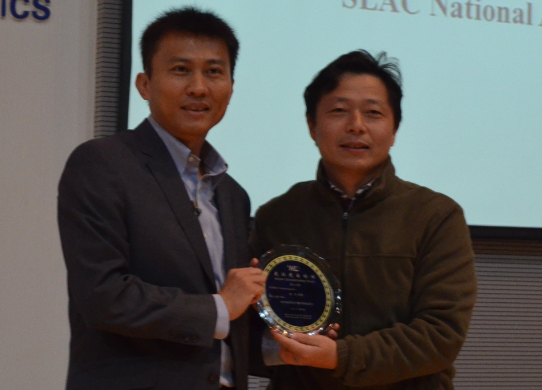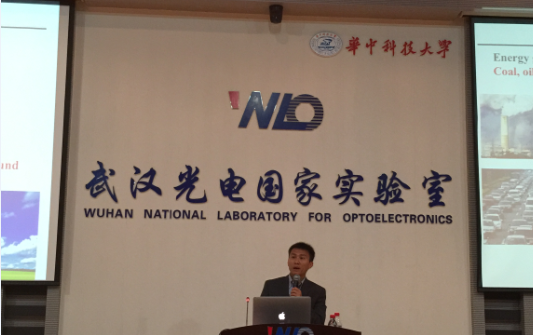WUHAN, China (November 12, 2015) - Wuhan Optoelectronics Forum No. 105 was successfully held in Auditorium A101 at Wuhan National Laboratory for Optoelectronics (WNLO) in the morning of November 12.
The development of nanotechnology in the past two decades has generated great capability of controlling materials at the nanometer scale and has enabled exciting opportunities to design materials with desirable photonic, electronic, ionic, chemical and mechanical properties, which are important for advanced energy conversion and storage and for addressing the environmental issues. Here I will show exciting examples on how we design materials at the nanocale for energy and environment, including 1) Nanocone solar cells with advanced photon management and nanowire transparent electrodes; 2) High-energy batteries for portable electronics and electric vehicles; 3) Novel environmental technologies such as water desalination batteries, thermal batteries, microbial batteries, water disinfection and air particle filters.
Yi Cui obtained his BS from the University of Science and Technology of China (1998) and Ph.D in Chemistry from Harvard University (2002). After that, he went on to work as a Miller Postdoctoral Fellow at the University of California, Berkeley. In 2005 he became an Assistant Professor in the Department of Materials Science and Engineering at Stanford University. In 2010 he was promoted to an Associate Professor with tenure and named as David Filo and Jerry Yang Faculty Scholar. He holds a joint appointment in SLAC National Accelerator Laboratory. His current research is on nanomaterials for energy storage, solar cells, topological insulators, biology and environment. He is a highly proliferate materials scientist and has published ~300 research papers and give ~300 plenary/keynote/invited talks. He is among top most cited scientists in the world (Google Scholar Search, H-index 113). He is ranked NO. 1 worldwide “Hottest Researchers of Today” in Materials Science (Thomas Reuters, 2014).Yi Cui is an Associate Editor of Nano Letters. He is a co-director of the Bay Area Photovoltaics Consortium ($25M by the US Department of Energy). He has won numerous honors recognizing his scientific contributions in these research areas, including MRS Fred Kavli Distinguished Lectureship in Nanoscience (2015), Fellow of Royal Society of Chemistry (2015),Blavatnik National Award Finalist (2015), Inaugural Nano Energy Award (2014), Blavatnik National Award Finalist (2014), the IUPAC Distinguished Award for Novel Materials and Synthesis (2013), the Wilson Prize (2011), the David Filo and Jerry Yang Faculty Scholar (2010), the Sloan Research Fellowship (2010), the Global Climate and Energy Project Distinguished Lecturer (2009), KAUST Investigator Award (2008) and so on.

